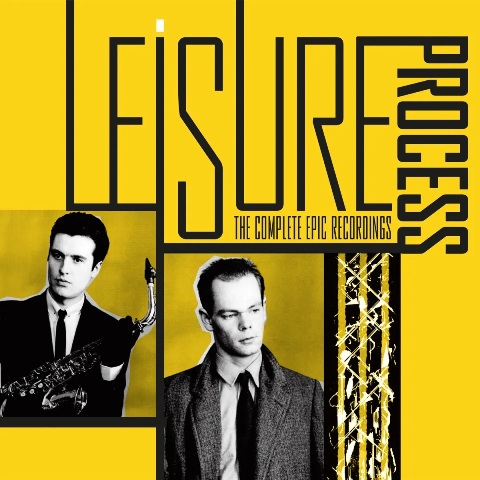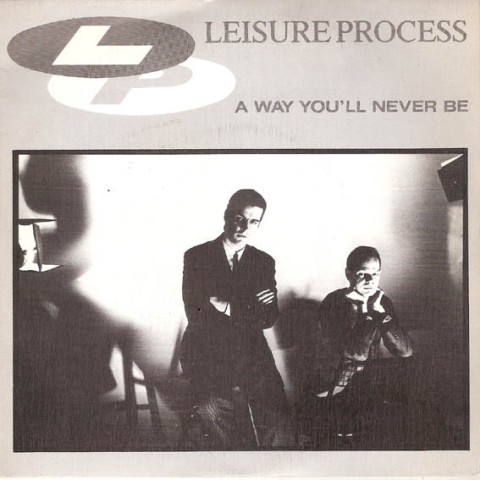Leisure Process issued four singles between March 1982 and May 1983. Signed to Epic Records, the electropop-inclined duo was primed for success. Debut 45 “Love Cascade” was Radio 1 DJ Peter Powell’s record of the week. At the other end of the coolness spectrum, John Peel also played the single. A Leisure Process Peel session was recorded on 10 March 1982.
Another factor feeding into the perception Leisure Process was ready for take off was the identity of their producer: Martin Rushent. He was integral to shaping British pop of the period. His work with Altered Images, The Human League and Pete Shelley defined an aspect of how the post-punk world embraced pop.
 Then there was Leisure Process singer Ross Middleton, a ready source of good copy. “You can illuminate someone’s life for three minutes on the dancefloor, but you’re also an instrument of control, a way of keeping the people quiet. People who dance to disco records don’t burn down police stations,” he told Melody Maker. For him, Orange Juice were “15-year-olds trying to play like Ry Cooder.”
Then there was Leisure Process singer Ross Middleton, a ready source of good copy. “You can illuminate someone’s life for three minutes on the dancefloor, but you’re also an instrument of control, a way of keeping the people quiet. People who dance to disco records don’t burn down police stations,” he told Melody Maker. For him, Orange Juice were “15-year-olds trying to play like Ry Cooder.”
“Love Cascade,” issued in March 1982, was a great – very, very early to mid-Eighties – single. Middleton’s morse-code-like guitar figures lead into a memorable chorus and a shrieking sax solo from Gary Barnacle, the duo’s other half. Yet, despite this accomplished opening shot, Leisure Process did not crash the charts.
June 1982’s follow-up single “A Way You'll Never be” was less immediate, a little like the dry, slap-bass-infused dance-pop of Heaven 17. After this, February 1983’s “Cashflow” was more bouncy, but the momentum has stalled. “Anxiety,” May 1983’s final single, was glossier, the least mannered of the four – but that was it: Leisure Process’ last gasp.
The full story is told by The Complete Epic Recordings, a double CD with a whopping 31-tracks. The four singles in their seven-inch and 12-inch versions are present with their flipsides. So are demos, DJ edits, rough mixes and instrumental backing tracks for untitled songs. Rather than bringing to light an unreleased album, it is a grab bag of what survives. The Peel session is not included.
 Ross Middleton and Gary Barnacle united after the former had left the band Positive Noise following the release of their first album. Also in the line up were his brothers, Fraser and Graham Middleton. Barnacle had toured with the band. Positive Noise had a fidgety take on post punk, on a line between the declamatory side of Magazine and fellow Scots The Associates. With Leisure Process, there were still hints of Magazine vocalist Howard Devoto and The Associates’ characteristically quivery approach to songwriting: former Magazine member Dave Formula plays piano on “The Fluke,” the B-side of “Love Cascade.” But Leisure Process were clearly aiming at a new pop audience distinct from one wedded to post-punk cultiness. This was underlined when bassist Mark King and drummer Phil Gould of Level 42 – Barnacle had played with the band – were on second single “A Way You'll Never be.” (pictured left, the Bolivian release of "Love Cascade")
Ross Middleton and Gary Barnacle united after the former had left the band Positive Noise following the release of their first album. Also in the line up were his brothers, Fraser and Graham Middleton. Barnacle had toured with the band. Positive Noise had a fidgety take on post punk, on a line between the declamatory side of Magazine and fellow Scots The Associates. With Leisure Process, there were still hints of Magazine vocalist Howard Devoto and The Associates’ characteristically quivery approach to songwriting: former Magazine member Dave Formula plays piano on “The Fluke,” the B-side of “Love Cascade.” But Leisure Process were clearly aiming at a new pop audience distinct from one wedded to post-punk cultiness. This was underlined when bassist Mark King and drummer Phil Gould of Level 42 – Barnacle had played with the band – were on second single “A Way You'll Never be.” (pictured left, the Bolivian release of "Love Cascade")
However, the breakthrough did not come. In his essay for The Complete Epic Recordings, Middleton suggests why. He writes that “Love Cascade” was played on the radio around its release date, but that actual records did not reach shops until a month later. “Apparently,” he recalls. “Would-be customers were being turned away in their tens of thousands [from record shops] up and down the UK: not an exaggeration, I phoned record shops all over the country.”
Otherwise, Epic Records did their bit. All four singles were issued in the Netherlands. “A Way You'll Never be” appeared in Spain. “Love Cascade” and “Cashflow” came out in Canada and Spain. Various versions of “Love Cascade” were pressed in the US. There were records in less familiar territories too. “Love Cascade” was issued in Bolivia, and “Anxiety” in New Zealand.
 Even though the duo were clearly courting the pop market, what Middleton said at the time undercut this somewhat. He would talk to the music press about issues which concerned him and then say “to the guys in the record company office, the message and meaning of recordings are irrelevant. We’re dealing with a vast business network with huge powers whose central interest is in shifting the units, whatever the product; The Clash or Barry Manilow. Obviously, there are similarities between ourselves and other duos like The Associates or B.E.F. but we don’t intend to project ourselves as businessmen.” Or “anyone that signs to a record company and willingly gets on the treadmill, they’re part of a process which is, of necessity, fickle and changeable and you can be dumped any minute.” (pictured right, the Spanish release of "A Way You'll Never be")
Even though the duo were clearly courting the pop market, what Middleton said at the time undercut this somewhat. He would talk to the music press about issues which concerned him and then say “to the guys in the record company office, the message and meaning of recordings are irrelevant. We’re dealing with a vast business network with huge powers whose central interest is in shifting the units, whatever the product; The Clash or Barry Manilow. Obviously, there are similarities between ourselves and other duos like The Associates or B.E.F. but we don’t intend to project ourselves as businessmen.” Or “anyone that signs to a record company and willingly gets on the treadmill, they’re part of a process which is, of necessity, fickle and changeable and you can be dumped any minute.” (pictured right, the Spanish release of "A Way You'll Never be")
And dumped they were. Following the release of “Anxiety,” Epic Records dropped Leisure Process. An album, meant to be titled Remarkable People With Interesting Lives, had been begun (the instrumentals heard here were recorded with this in mind). It was put on permanent hold.
Looking back, Middleton concludes that after “Love Cascade,” “we sort of dropped off the radar. Great things had been expected of ‘Love Cascade.’ When that didn’t chart, the music press, and public interest, shifted.” He also places the blame for the demise of Leisure Process on his own shoulders. “Leisure Process, who really could have been big, ground to a halt solely because of me,” he writes. “I didn’t know it back then, but I was suffering from a clinical depression which was to torment me for the next two decades until I finally sought treatment.” Clearly, there was more to it than this. The Complete Epic Recordings doesn’t quite answer the question of what might have been, but it is a valuable reminder that this duo could, should have ignited the charts.
- Next week: Eternity’s Children and Timeless – the two albums by late-Sixties harmony poppers Eternity’s Children reappear
- More reissue reviews on theartsdesk
- Kieron Tyler’s website















Add comment